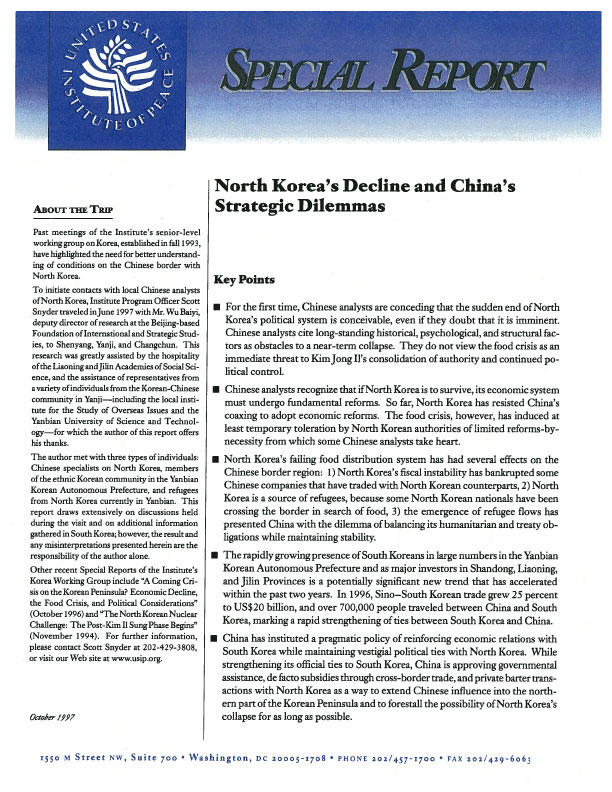North Korea's Decline and China's Strategic Dilemmas
For the first time, Chinese analysts are conceding that the sudden end of North Korea's political system is conceivable, even if they doubt that it is imminent. Chinese analysts cite long-standing historical, psychological, and structural factors as obstacles to a near-term collapse. Chinese analysts recognize that if North Korea is to survive, its economic system must undergo fundamental reforms.

Key Points
- For the first time, Chinese analysts are conceding that the sudden end of North Korea's political system is conceivable, even if they doubt that it is imminent. Chinese analysts cite long-standing historical, psychological, and structural factors as obstacles to a near-term collapse. They do not view the food crisis as an immediate threat to Kim Jong Il's consolidation of authority and continued political control.
- Chinese analysts recognize that if North Korea is to survive, its economic system must undergo fundamental reforms. So far, North Korea has resisted China's coaxing to adopt economic reforms. The food crisis, however, has induced at least temporary toleration by North Korean authorities of limited reforms-by-necessity from which some Chinese analysts take heart.
- North Korea's failing food distribution system has had several effects on the Chinese border region: 1) North Korea's fiscal instability has bankrupted some Chinese companies that have traded with North Korean counterparts, 2) North Korea is a source of refugees, because some North Korean nationals have been crossing the border in search of food, 3) the emergence of refugee flows has presented China with the dilemma of balancing its humanitarian and treaty obligations while maintaining stability.
- The rapidly growing presence of South Koreans in large numbers in the Yanbian Korean Autonomous Prefecture and as major investors in Shandong, Liaoning, and Jilin Provinces is a potentially significant new trend that has accelerated within the past two years. In 1996, Sino-South Korean trade grew 25 percent to US$20 billion, and over 700,000 people traveled between China and South Korea, marking a rapid strengthening of ties between South Korea and China.
- China has instituted a pragmatic policy of reinforcing economic relations with South Korea while maintaining vestigial political ties with North Korea. While strengthening its official ties to South Korea, China is approving governmental assistance, de facto subsidies through cross-border trade, and private barter transactions with North Korea as a way to extend Chinese influence into the northern part of the Korean Peninsula and to forestall the possibility of North Korea's collapse for as long as possible.
- The issue of foreign influence on the Korean Peninsula has historically been a source of competition among China, Japan, and the Soviet Union, and between the United States and China--the latter two countries carrying historical and psychological baggage from the Korean War. Today, however, the United States and China share the fundamental objectives of maintaining stability and preventing the outbreak of violence on the Korean Peninsula. The extent to which the United States and China cooperate or compete in managing the Korean issue will have a significant impact on the future of Korea and Northeast Asia.



